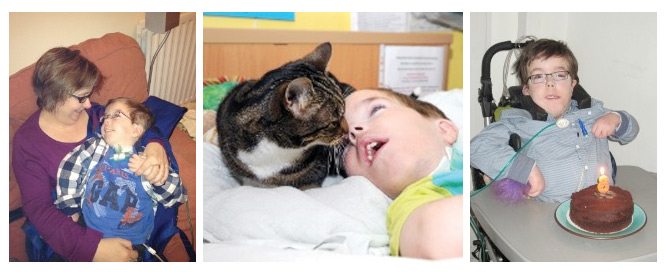Alfie Scott is now 8 and lives at home with his mum, dad and two cats. He goes to a specialist school for children with visual and other disabilities, where he was pupil of the year last year. He loves a cuddle, swimming, chocolate, and going in his wheelchair on bumpy surfaces, or in the wind and rain which can make him laugh. He loves being around people, but sometimes is too sleepy to enjoy the world around him.
Alfie was found to have multiple brain malformations when he was 2 days old, had his first seizure at the age of 3 months and has never been free of attacks since. He is one of over approximately 60,000 children in Europe with an epileptic encephalopathy. These are a group of conditions characterized by childhood onset frequent seizures which don’t respond to standard drugs together with developmental delay, severe cognitive and sometimes behavioural problems.
Living With Epilepsy
By the time he was 5, Alfie had tried 7 different antiepileptic drugs as well as the Ketogenic diet, with limited success and in the early years he had multiple hospital admissions with chest infections due to weakness and poor coordination affecting his breathing and his swallowing. Although some of these were life threatening, it is the unpredictable nature of his epilepsy and sleepiness that his parents find hardest to live with day to day, and which most affects his quality of life. When he’s having a very sleepy or fitty day, he interacts poorly and it can be hard for the person with him to keep their spirits up. His physical disabilities can be compensated for with equipment and extra help, but if he is having lots of seizures or unresponsive, you just have to wait for the bad spell to pass which can last hours, days or sometimes weeks. Other days he can suddenly be very perky and smiley, lifting the mood of people around him as well. His epilepsy is about much more than seizures.
Alfie’s parents’ main aspiration is that they can continue to support Alfie to have the best life he can. Improved awareness and understanding about epilepsy and disability underpin this, as well as investment into services and support for such children and their families. Research is also starting to unlock some of the mechanisms and lead to new treatments. This of itself provides hope, the importance of which in challenging circumstances cannot be underestimated.

